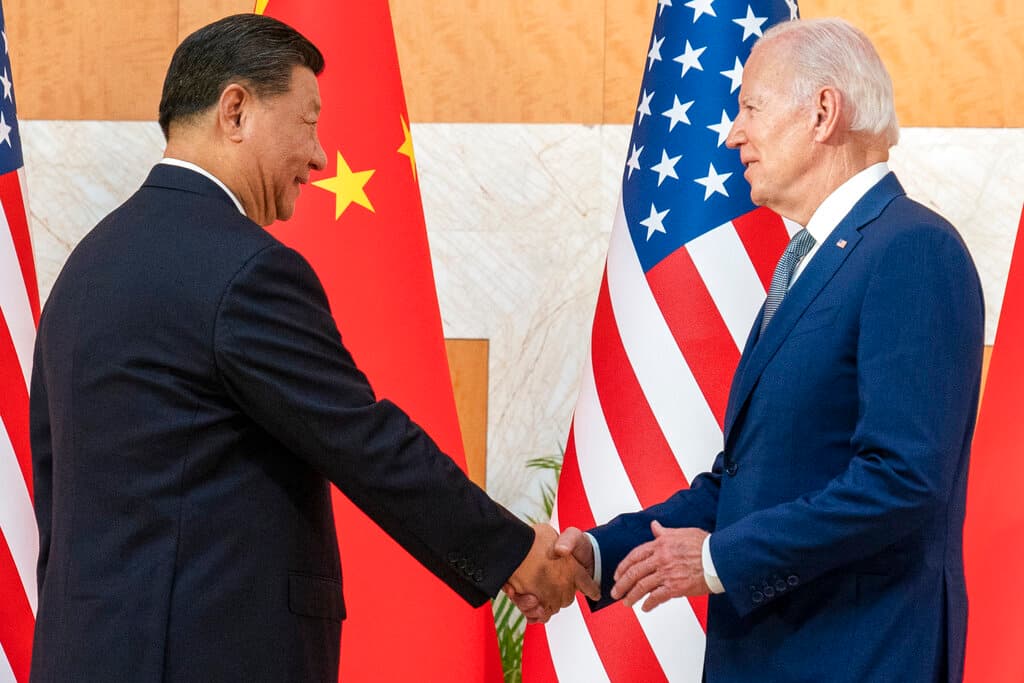Biden Would Be Wise To Concede Nothing at High-Stakes Meeting With Xi, Republicans on Select Committee Say
Congressman Gallagher and his colleagues are calling upon President Biden to abandon his policy of engagement with the People’s Republic and adopt a more assertive posture.

When President Biden on Wednesday goes face-to-face with President Xi for the first time in a year, he will have a “final opportunity” to challenge Communist Chinese aggression. So say Congressman Mike Gallagher and the Republican members of his select committee on China ahead of the highly anticipated meeting between the two economic rivals.
“Despite repeated concessions from Washington over the past year, Beijing has made none and continues to threaten core U.S. interests,” Mr. Gallagher tells the Sun. He and his Republican colleagues demanded, in a letter to Mr. Biden last week, that the administration abandon its policy of engagement with the People’s Republic and adopt a more assertive posture.
“The administration,” Mr. Gallagher says, “should walk away from the table if the CCP proves unwilling to address even the most basic issues in the relationship, such as immediately releasing all Americans wrongfully detained in the PRC, ceasing dangerous and unjustifiable intercepts of American forces, and halting operations in Taiwan’s Air Defense Identification Zone east of the Median Line.”
With the goal of easing tensions, Messrs. Biden and Xi are set to discuss reopening military communications channels, managing bilateral competition, and security issues, officials from the Biden administration said. The meeting will take place at a gathering at San Francisco of leaders of 21 countries in the Asia-Pacific Economic Conference.
The meeting is the culmination of visits of multiple high-level Cabinet officials to the People’s Republic over the last year and a half. This strategy is what Mr. Gallagher calls “zombie engagement” — the theory that economic and diplomatic ties to China will make them a responsible stakeholder in the international system. That practice, he argues, has failed for more than 30 years.
“This month’s meeting with Xi Jinping presents a final opportunity to reverse your misguided policy and challenge Beijing to demonstrate its seriousness about improving U.S.-PRC relations,” Mr. Gallagher wrote in his letter. He added that “these asks are the beginning, not the end of the necessary behavior change the PRC needs to undertake to demonstrate it truly wants a better relationship with the United States and the world.”
The first two of the 10 demands in the letter concern the release of detained or exit-banned American citizens in China. Three Americans are wrongfully held in China right now, including a businessman from Texas, Mark Swidan, who is on death row in China. He has denied the charges of narcotics trafficking against him. Republican lawmakers argue that the U.S. government has shown a lack of urgency toward his case.
The other demands on Beijing include establishing know-your-customer requirements for imported fentanyl precursors, dropping charges against Chinese pro-democracy advocates, and ceasing key forced labor programs in Xinjiang. “Short of clear commitments on this low-hanging fruit,” Mr. Gallagher tells the Sun, “APEC needs to be the end of the road for zombie engagement.”
While prioritizing bilateralism, the Biden administration has failed to take defensive actions, like sanctioning Chinese officials for the genocide in Xinjiang or the suppression of freedom at Hong Kong, the letter states. Intensifying tensions in the Taiwan Strait and military provocations in the South China Sea, meanwhile, have intensified volatility between Washington and Beijing. Achieving any bilateral agreement this week will be a challenge.
Yet the United States does not seek to decouple its economy from China’s, Secretary Yellen asserted on Friday following two days of meetings with the Chinese vice premier, He Lifeng, at San Francisco. Mr. Gallagher, meanwhile, urges a “strategic decoupling” from China to reduce American economic dependencies in key areas such as critical minerals and advanced pharmaceuticals.
“This engagement — I think it’s dangerous, it’s naive, and paradoxically, it’s going to make the Chinese Communist Party more aggressive,” Mr. Gallagher told reporters on Saturday, “because these Marxist-Leninist regimes get more aggressive the more you appease and accommodate them.”

